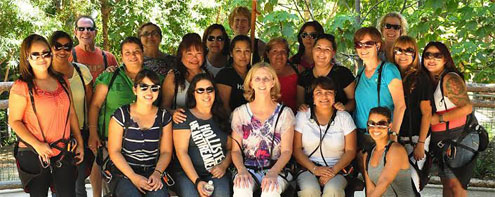After 50 years of service, the Women's Health Care Clinic (WHCC) closed on November 30, 2016. All program components are no longer in operation, including:
- Clinical services at Harbor-UCLA, Compton-WIC and Catalina Island;
- The Women's Health Care Nurse Practitioner Training Program;
- Continuing education programs for clinicians;
- Community-based outreach and education.
The WHCC provided quality, unbiased family planning and reproductive health care services and community-based prevention education and outreach. Over the years, WHCC has excelled in improving access to care for underserved communities, as well as advancing clinician skills to provide top tier patient care.
Medical Records
For patient medical records, please contact:
Email: records@lundquist.org
Alumni & Graduate Records
For alumni/graduate records, including transcripts, education verifications, and matters related to colposcopy certification, please contact:
The Lundquist Institute Office of Education
Email: whcc@lundquist.org
Phone: (323) 457-1698
For transcripts and education verifications, there is a $25 fee per transcript copy/verification letter. You can place a request and pay online. Please note that if you are not the nurse practitioner that a disclosure authorization form must be uploaded as part of the online request.
REQUEST TRANSCRIPTS/EDUCATION VERIFICATION
OB/GYN Medical Protocol
Due to the closure of the Women's Health Care Clinic, protocols are no longer be available.
About Us

The Women's Health Care Clinic was a community program of the The Lundquist Institute for Biomedical Innovation at Harbor-UCLA Medical Center a private, non-profit biomedical research agency governed by a 27-member board of directors.
For over 50 years, WHCC was a program of excellence providing top-tier family planning and reproductive health care, serving as a model program in the County excelling in systems-level developments, and serving as a lead training site in the country for health care professionals. WHCC has forged best practices in the field and remained at the cusp of cutting-edge reproductive health care advancements to better meet the needs of the most vulnerable communities in the South Bay, Compton and South Los Angeles areas. Combining the power of a patient-centered vision with experiential longevity, expertise and entrepreneurial strength, WHCC was rooted in a tradition of continued capacity building for new services, programs, and locations.
In 1966, the Women's Health Care Clinic (WHCC) started as a Pap Clinic, designed to teach registered nurses how to perform the Pap test, with grant funding support from the U.S. Public Health Department. Within three years, this site became the first nurse practitioner training program operating in the U.S. By 1971, the WHCC was fully established and funded by federal Title X dollars. The WHCC was functioning successfully as a health care clinic and an intensive training site for nurse practitioners for family planning and women's health care, called the Women's Health Care Nurse Practitioner Program. With the new California law that nurse practitioners must be master's level prepared, the Women's Health Care Nurse Practitioner Program graduated its last class in November 2007, and transitioned into the Education Program, offering continuing education for practicing nurses.
In 1996, the WHCC established a clinic inside the WIC center in Compton, as a pilot project to provide a one-stop shop for WIC clients to have better access to family planning services. In July of 2008, the WHCC established a clinic inside the Catalina Island Medical Center to better serve the residents of Avalon.
In December 2013, the Women's Health Care Clinic at Harbor-UCLA was absorbed by the Los Angeles County, Department of Health Services. After that transition, the WHCC continued to operate the Compton-WIC and Catalina clinics, as well as continuing education programs, community outreach and the OB/GYN Medical Protocol.
On November 30, 2016, all programs and services of the Women's Health Care Clinic closed due to funding challenges.
